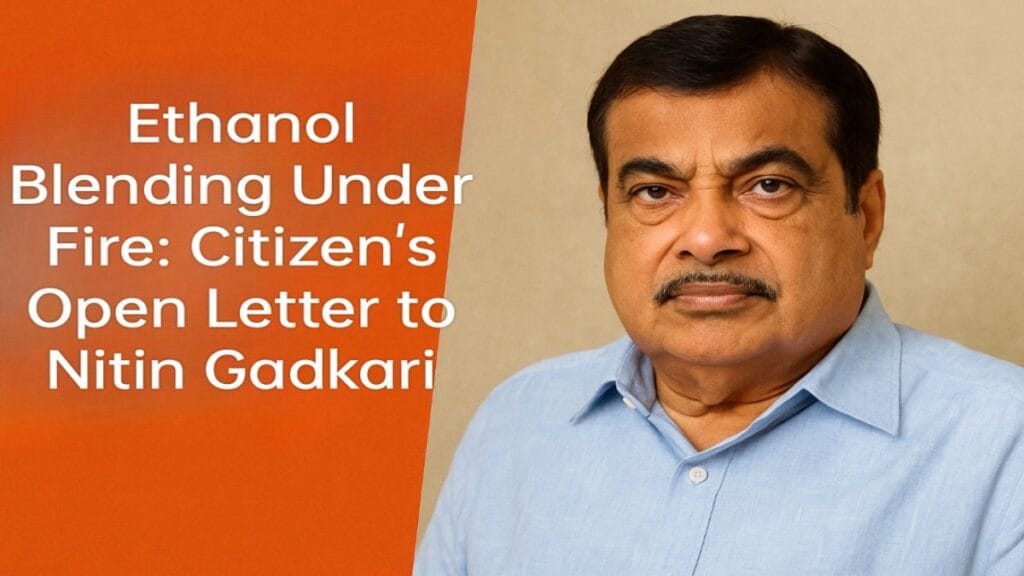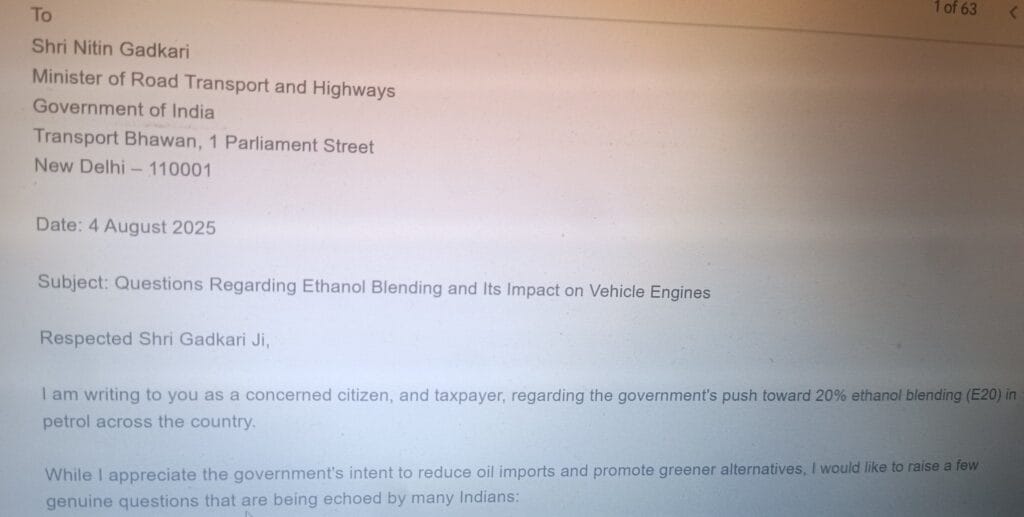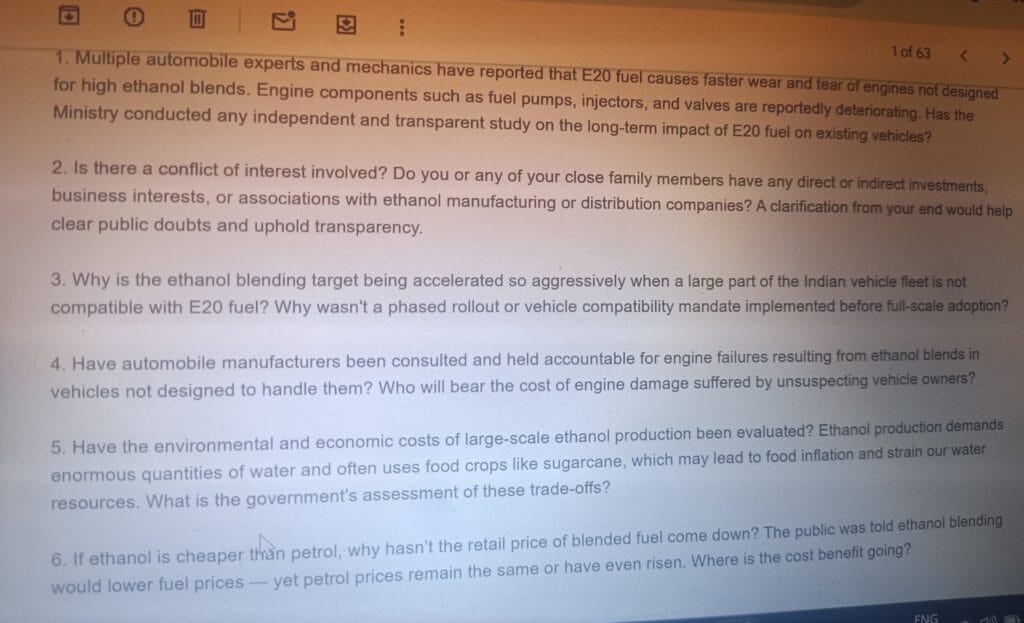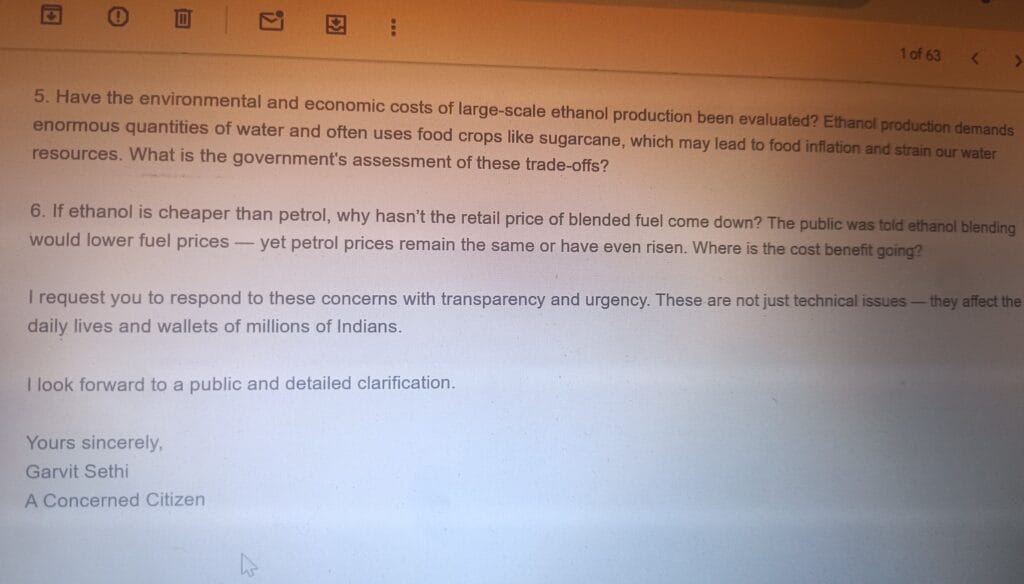
In a bold and articulate move, a concerned citizen, Garvit Sethi, has penned an open letter to Union Minister for Road Transport and Highways, Shri Nitin Gadkari, questioning the rapid push toward 20% ethanol blending (E20) in petrol across India. The letter, dated August 4, 2025, raises several pertinent concerns regarding the long term effects of E20 fuel on existing vehicles, pricing inconsistencies, environmental trade offs, and possible conflicts of interest in the ethanol industry.
This public letter has reignited the national debate over the ethanol blending policy, which has seen an accelerated rollout despite pushback from automobile experts and environmental economists.
Is Ethanol Blending Damaging Engines?
At the heart of Sethi’s letter lies the issue of engine damage. According to numerous reports from mechanics and auto experts, vehicles not specifically designed for E20 fuel are already showing signs of accelerated wear and tear. Components such as fuel pumps, injectors, and valves are reportedly deteriorating faster, potentially increasing the maintenance burden on vehicle owners.
Garvit Sethi rightly questions whether the Ministry has conducted any independent, peer reviewed studies to assess the long term impact of ethanol blended fuel on India’s predominantly legacy vehicle fleet.


Where is the Price Cut?
Another crucial concern raised in the letter is the retail price of ethanol blended petrol. Despite ethanol being significantly cheaper to produce than petrol, fuel prices at the pump have shown no significant reduction. This raises the question: Where is the cost benefit going? Many citizens were led to believe that blending ethanol would reduce petrol prices, yet the opposite seems to have happened in many cities.
Conflict of Interest Allegations
In a bold and transparent move, Garvit Sethi has also questioned whether Minister Nitin Gadkari or his close family members have any direct or indirect stakes in ethanol production or distribution businesses. The citizen demands a public clarification to rule out any conflict of interest, a question that is now gaining traction on social media.
Were Car Manufacturers Consulted?
Another area of concern is the lack of coordination with automobile manufacturers. While newer vehicles may support higher ethanol blends, a vast majority of Indian vehicles particularly two wheelers and older cars were not designed for E20 compatibility. The letter questions whether any compensation or accountability measures have been discussed with auto companies in the event of fuel induced engine damage.
Environmental and Economic Trade Offs
The ethanol blending policy, though marketed as eco-friendly, is also facing scrutiny for its environmental and agricultural impact. Ethanol is primarily produced from sugarcane and other food crops, which raises the issue of food inflation and water resource depletion. The production process demands vast quantities of water, and critics argue that this could undermine India’s food security and climate goals.

Sethi questions whether the government has conducted a comprehensive cost benefit analysis on the environmental footprint and economic trade offs of ethanol blending an analysis that has not yet been made public.
Rushed Rollout Without Preparation?
Garvit Sethi’s letter also points to the aggressive timeline for achieving 20% ethanol blending without adequate preparation. He suggests that a phased rollout, beginning with E10 compatible zones and vehicles, would have been more logical and less damaging to consumers.
As of now, millions of Indian drivers are unknowingly filling their tanks with fuel that may harm their engines in the long run a problem that could have been avoided with stronger public awareness and regulatory clarity.
Call for Transparency and Accountability
In conclusion, Sethi urges Shri Gadkari to publicly address these six core issues with clarity and urgency. His letter has started to circulate widely on social media platforms like X (formerly Twitter), where citizens are echoing similar concerns
This development could mark a turning point in the public discourse on ethanol blending in India. The government, which has so far celebrated the E20 target as a green initiative, now faces tough questions on practical execution, affordability, transparency, and environmental sustainability.
Stay connected with The News Drill for more updates.
Got a story, opinion, or tip related to ethanol blending? Email us at: editor@thenewsdrill.com
For queries or clarifications, write to: contact@thenewsdrill.com
















